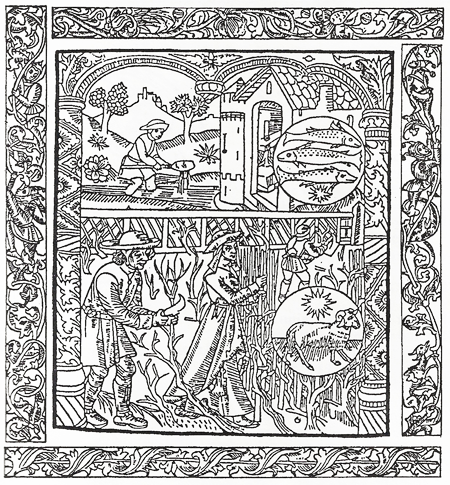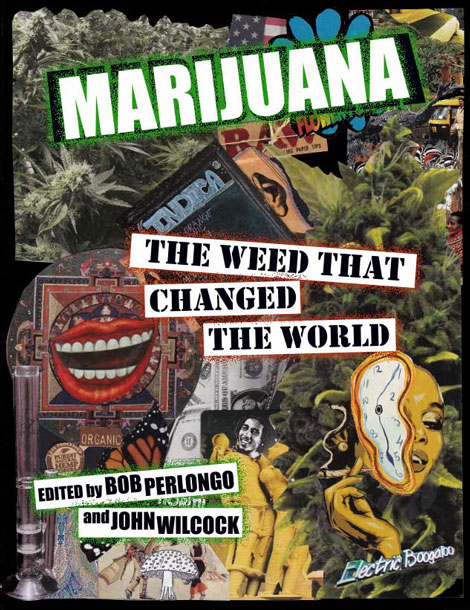
The Column of Lasting Insignificance: February 22, 2014
by John Wilcock

Spring: first principles for the first season
A classical conversation
“Come fill the cup, and in the fire of Spring
The Winter-garment of Repentance fling
The Bird of Time has but a little way
To fly — and Lo! The Bird is on the Wing.”
— Omar Khayyam (1070–1133)
AH: It takes a certain amount of intelligence and imagination to realize the extraordinary queerness and mysteriousness of the world in which we live.
JSH: The universe may be not only queerer than we suppose but queerer than we can suppose.
SK: The very meaninglessness of life forces a man to create his own meaning.
MA: The universe is change; our life is what our
thoughts make it.
P: Thinking is identical with being.
D: The first principles of the universe are atoms and empty space; everything else is merely thought to exist.
DHL: We and the cosmos are one. The cosmos is a vast living body, of which we are still parts.
GS: No doubt the spirit and energy of the world is what is acting in us, as the sea is what rises in every little wave; but it passes through us; and cry out as we may, it will move on. Our privilege is to have perceived it as it moved.
A: The ultimate value of life depends on awareness, and the power of contemplation rather than upon mere survival.
JT: Let us not look back in anger or forward in fear, but around in awareness.
LB: The great object of life is sensation—to feel that we exist, even though in pain.
BG: The first great rule of life is to put up with things.
JvG: This is a lesson we cannot learn too soon, that the world can go on easily without us.
[Spring: the first of a series, is extracted from A Book of Days; Wisdom Through the Seasons by Elizabeth Pepper & John Wilcock]
CONVERSATIONALISTS: Aldous Huxley (English author, 1894-1963); John Scott Haldane (1860-1936, English physiologist); Stanley Kubrick (1928-1999, American film director); Marcus Aurelius (121-180, Roman emperor); Parmenides (539-469BC, Greek philosopher); Democritus, 460-370BC, Greek philosopher); D.H. Lawrence (1885-1930, English novelist); George Santayana (1863-1952, Spanish-American philosopher); Aristotle (384-322BC, Greek philosopher); James Thurber (1894-1961, American humorist); Lord Byron (1788-1824, English poet) Baltasar Gracian (1601-1658, Spanish author); Johann von Goethe (1749–1832, German poet).
++++++++++++++++++++
RAISE A CELEBRATORY GLASS to the surprisingly contemporary magazine Current History which began exactly 100 years ago as a New York Times supplement to document World War I. Since 1943 it has been owned by Philadelphia’s Redmond family, whose fourth-generation publisher Daniel Mark Redmond says that “continuity” has been the mag’s defining feature. It has bylined the work of some knock-out names: Leon Trotsky (How We Made the October Revolution); Winston Churchill (What Can England Do About Hitler?); John Dewey (Religion in the Soviet Union); Charles Lindberg (The History of the Atlantic Flight); H.L. Mencken (Notes on the New Deal); and Madame Chiang Kai-shek (China Unbowed). Some cast, eh? Circulation, though only about 15,000, belies its influence because of huge pass-on readership in libraries and academic institutions.
DEMOCRACY OBVIOUSLY HAS many critics, indeed skeptics, but all things considered, it still seems to be on the right side of history, the wave of the future. “No other broadly legitimate form of government exists today,” writes Larry Diamond, “and authoritarian regimes face profound challenges and contradictions that they cannot resolve without moving toward democracy.” Since WWII, the outlook has not always been so optimistic. First came the rise of communism and fascism added to the between-wars shock of the Great Depression. Then followed the melancholy period when military coups took hold in Latin America, Greece, Turkey, and parts of Asia — a period described by Current History as one of “authoritarian socialist models and ideologies.” Africa’s record, too, has been bleak, with the proportion of democratic countries dropping from almost half in 2006, to about one-third today.
But the times really are a-changing, the mag insists, with 40% of the world’s countries (79 altogether) now ranked as democratic by Freedom House, the independent watchdog organization, although they did agree that last year was the worst one for democracy in two decades. “Emancipation from authority” is the direction in which people’s thoughts are moving, bolstered by the “psychological shift in the rise of civil society, independent organizations, and flows of information, opinion, and ideas.” Even in China, predicts CH, “the decay of communist rule and the rise of a middle-class society are much more advanced than has generally been appreciated.”
SWITZERLAND, WITH A per capita income of $80,000 a year, is a country that already lives better than well. But an activist group is seeking legislation to award every citizen an annual income of $33,000 a year whether they work or not. “If we were to hold the vote this Sunday, it would fail terribly, but we have two or three years to make our case,” says Daniel Straub, the coordinator of the proposed referendum, adding: “If unemployment goes up that’s a great thing. Because we should see unemployment as freeing people up to pursue what creates meaning for them.” Philosophically, comments Bloomberg Businessweek, the idea dates back at least to the English-American revolution, but “low-paying, low-status jobs such as garbage collection would likely become increasingly expensive to fill.”
IF A LESBIAN and a straight guy were locked in a apartment together for a couple of months, would the sexual pressure cause a change in their orientation? It’s a provocative question from New York writer Olly Johnson that will never be answered because, he says, “Obviously it’s a completely untenable circumstance that, for both moral and legal reasons, couldn’t be put into practice.” But there are many dilemmas that can’t find obvious solutions. “Supposing some country,” Johnson offers, “decided to install a high-powered fence on its border that would electrocute would-be infiltrators. It would certainly reduce illegal immigration, and in the Cold War era probably happened. But can you imagine any country doing it today?”
The conundrum about changing sexual orientation was sparked last week with a New York Times column by Jacob M. Victor revealing that California and New Jersey had banned so-called “sexual therapy” allowing therapists’ attempts to convert homosexuals from their preferred orientation. “Such attempts,” Victor wrote, “not only fail but are also linked to suicidal behavior, depression, anxiety, drug use, and risky sexual behavior.” Unarguably, this must be true in many cases, if not all; messing around with people’s minds, “brain-washing,” can result in some unexpectedly dismal results. But a complete ban on such attempts sounds like political correctness run amok. A heterosexual might be changed via opportunity, so can we say categorically that the reverse can never be true? Many people believe that millions of children are pressured into believing that violence is fun because of toy guns, death-dealing video games, and NFL propaganda. Should we ban those?
THE WILCOCK WEB: Last week, the suggestion that the Post Office be operated as a simple bank that can be used by millions of the 99% who don’t have one, came up again. Similar versions exist in many countries. It’s a sensible idea and has always been a sensible idea. But what’s the future of any idea that doesn’t provide individual bribes for pols to vote for it?…. …New York State’s governor, Andrew Cuomo — a DINO (Democrat in Name Only) — has plans for banks to pay less taxes…. Bob Hope quipped that a bank is a place that will lend you money if you can prove you don’t need it… …Las Vegas’ McCarran airport was the first in the US to offer free WiFi and now plans to extend it, beaming it to nearby planes as they land and depart. JFK, O’Hare, and LA still charge, but many others are making it free…Copenhagen Zoo killed one of its zebras because it was too much like the others… .Australia explains that when it mandated removing branding from cigarette packs, it reduced smoking because “smokers perceived plain-packaged cigarettes to be of lower quality and so less satisfying”…. You’ve just missed last month’s induction into the Bubblewrap Hall of Fame, a Burbank magician/comic, Eric Buss,

selected the winner from among 2,000 competitors with his Bubblewrap bicycle…. The latest lobbying group of do-gooders, Action on Sugar (AoS) calls that irresistible sweet substance, “the new tobacco,” and is lobbying the British government to force food manufacturers to reduce its content in their products by 30%….Why on earth is pushing a stone across the ice (curling) defined as a sport?….When the Taliban takes over (again) in Afghanistan, what the country could use is an all-female army to fight for women’s rights …Hamid Karzai ran with the Taliban before we invaded Afghanistan 11 years ago, and plans to return to them when we leave …..Police say random clowns wandering around Kings Lynn are frightening the public….. The Smithsonian spends more than $1,000 per week on bamboo shoots to feed its pandas…..One reason poverty persists, write Eli Lehrer and Lori Sanders in the weekly Standard, is how unwilling people are to change their circumstances. “The federal government ought to do what it can to encourage people to move from places that lack opportunities to those that offer them in abundance” ….Wrigley reported a jaw-dropping 20% fewer sale of chewing gum than five years ago… Fashion Week is when the 1% congratulate themselves on what they perceive to be their superior sense of taste and style…. “Whenever you find yourself on the side of the majority, it is time to pause and reflect.” — Mark Twain (1835-1910)
it’s here…

